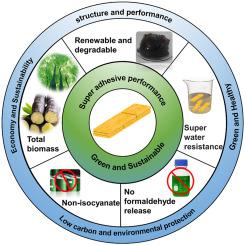Composites Part B: Engineering ( IF 12.7 ) Pub Date : 2023-06-28 , DOI: 10.1016/j.compositesb.2023.110872 Hongxing Yang , Xiaoping Tan , Guanben Du , Kelu Ni , Yingchen Wu , Zhi Li , Xin Ran , Wei Gao , Jun Li , Long Yang

|
Both increasing environmental issues and the lack of fossil resources have increased the importance of wood-based natural fiber composites. Therefore, high performance, sustainable, and environmentally-friendly bio-based wood adhesives are highly desirable. We developed a new biomass adhesive based on aminated cellulose (AC) and oxidized sucrose (OS), and reinforced it with an activated wood interface to improve its bonding performance. To this end, the natural wood interface (NWI) was customized with an epoxy group to produce the epoxy-functionalized wood interface (EFWI), one end of which is tethered to the wood surface. The epoxy group at the other end reacts with the amino group of AC, resulting in hydrophobicity and forming new covalent bonds in the adhesive layer, such as -Si-O-Si-, -Si-O-C-, -C-N-C-, and -O-C-C- bonds. Characterization of the adhesive interface is realized by FTIR, 13C NMR, XPS, XRD, and SEM. Dry and wet shear strengths are also investigated by tensile shear strength measurements in China National Standards (GB/T 9846-2015). Results show that OS-AC adhesives have better dry and wet shear strengths at EFWI in comparison with those on NWI, reaching 2.52 and 1.48 MPa, respectively. Thus, the construction of a functionalized wood adhesive interface dramatically enhances the bonding strength and water resistance of biomass adhesives. This study provides new insights for developing renewable, low cost, and green bio-based wood adhesives by chemical modification of the wood interface.






























 京公网安备 11010802027423号
京公网安备 11010802027423号